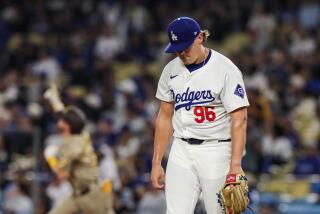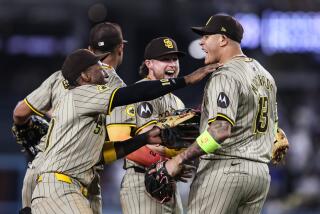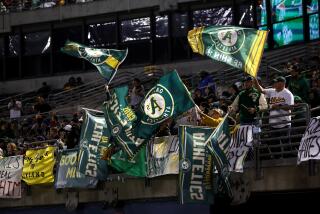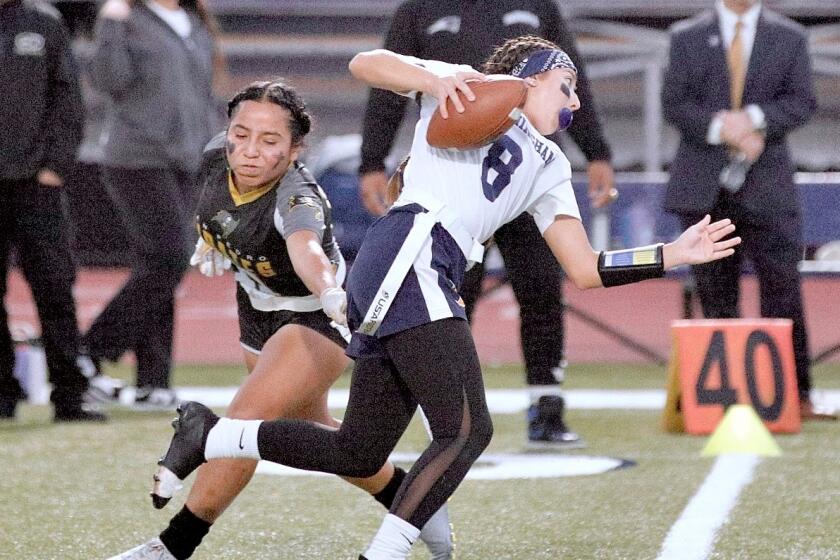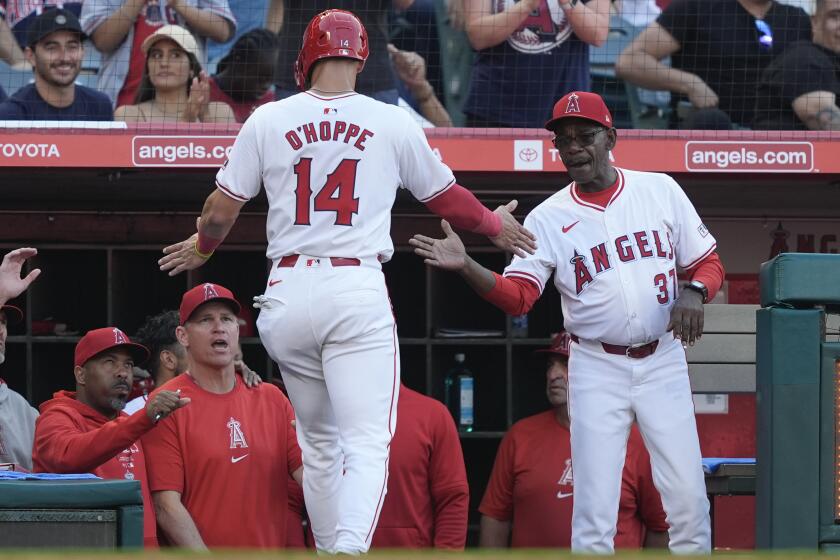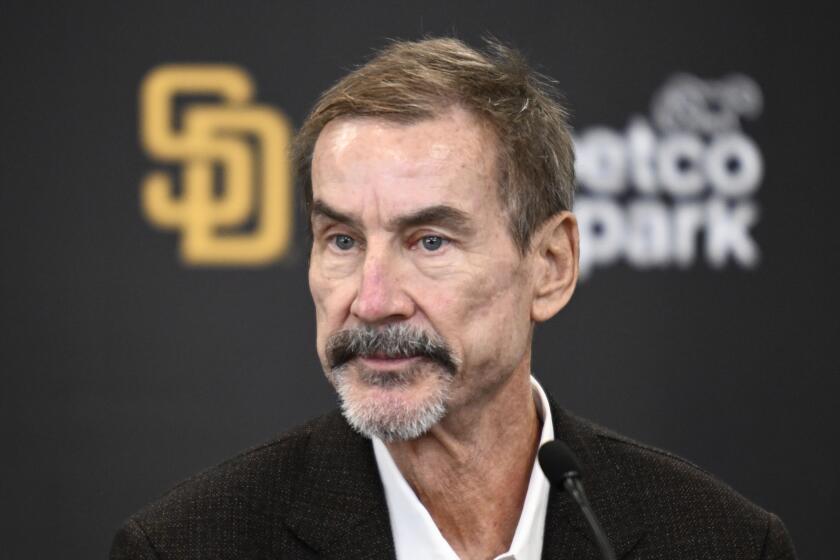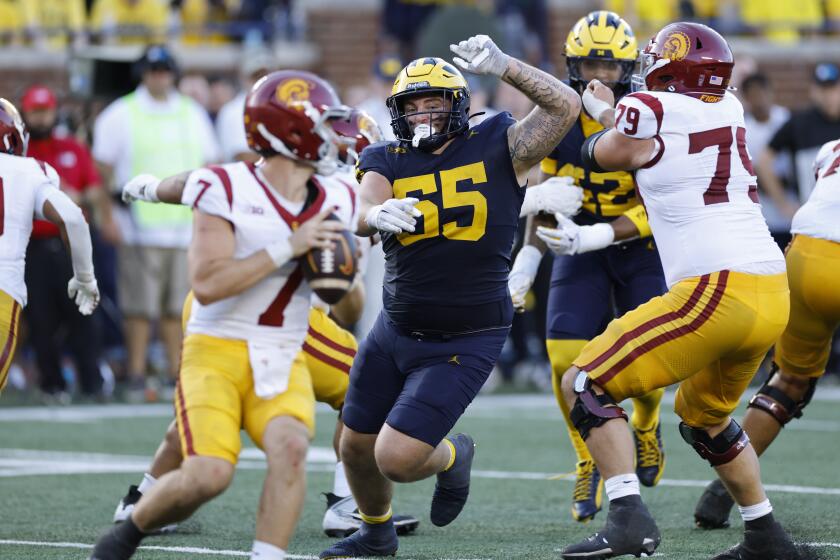Barry Bonds’ lawyer says slugger never lied to grand jury
Reporting from San Francisco -- Slugger Barry Bonds never lied to a grand jury and even admitted that he may have unwittingly used steroids, his defense lawyer said in federal court Tuesday.
Bonds acknowledged that he had used two substances shown to him during his appearance before the grand jury in 2003 but did not know they were actually anabolic steroids, said Allen Ruby, Bonds’ lead attorney. His alleged crime took place in the presence of “a stenographer who took down every word — thankfully,” Ruby said.
The former San Francisco Giants star is on trial for allegedly lying to the grand jury, which was investigating steroid distribution by a Bay Area laboratory and by Bonds’ former personal trainer, an associate of the lab. Ruby suggested that a careful reading of the transcript would show Bonds answered questions truthfully.
Key prosecution witnesses slated to testify were bitter that Bonds had broken relations with them and upset that they would no longer profit from their association with him, Ruby told a jury of eight women and four men during opening arguments in the perjury trial.
He noted that Kimberly Bell, Bonds’ former mistress, shopped a book after Bonds broke up with her and went to the media with stories about the home run king.
Once spurned, these former friends helped create a “caricature” of Bonds that contributed to a “poisonous” portrait of him, Ruby said.
“And Barry is not a caricature,” Ruby said. “He is a man. And whether the evidence persuades you he is an admirable man or not, or something in between, we can all agree it has nothing to do with the charges that the United States has brought against him.”
But a federal prosecutor contended that Bonds told friends before 2003 that he was using steroids and concocted lies before he ever went into the grand jury room.
The defendant was given immunity,” Assistant U.S. Atty. Matthew Parrella told jurors. “All he had to do was tell the truth. That’s all he had to do, was tell the truth, but he couldn’t do it. And the evidence will show that he planned not to do it.”
Parrella called Bonds’ claim that he thought he was using flaxseed oil and arthritis cream “an utterly ridiculous and unbelievable story” — a comment that was struck from the record after a defense objection.
“Out of the defendant’s own mouth, to people who knew him intimately, friends for decades, the defendant admitted he knew what he was doing,” Parrella said.
Both in opening arguments and in examining a government investigator later in the day, prosecutors told a clear narrative of how an investigation into the Burlingame-based Bay Area Laboratory Cooperative that purportedly tested blood mushroomed into a scandal that rocked professional sports.
They said the probe began with a lone federal agent rifling through the laboratory’s garbage at midnight, checking its bank records and reading its e-mails. The probe eventually yielded a “treasure trove” of illegal steroids and performance-enhancing drugs and the convening of the grand jury that ensnared Bonds.
Parrella told the jury Tuesday that it would hear from Bell, who started a roughly 10-year relationship with Bonds when he was married to his first wife and that carried over into his second marriage.
The prosecutor said Bell would testify that Bonds told her he was using steroids and suffered sexual dysfunction as a result of the drugs.
Charged with obstruction of justice and four counts of lying to the grand jury, Bonds could face prison or house arrest. A conviction also would hinder him from being elected to the Hall of Fame. Bonds broke the home run records of Hank Aaron and Babe Ruth at a time when prosecutors say he was knowingly using steroids.
After excusing the jury for lunch, U.S. District Judge Susan Illston ordered Greg Anderson, Bonds’ personal trainer and childhood friend, into custody for refusing to testify. Prosecutors say Anderson provided Bonds and other athletes with steroids.
Anderson already has served nearly two years behind bars, mostly for refusing to testify against Bonds. Bonds looked away when Anderson entered the courtroom with his attorney. Throughout much of the day, Bonds listened intently to the arguments and testimony without showing any emotion.
Illston later told jurors that Anderson was “unavailable to both parties,” and jurors were not to make any inference about his absence. The judge has indicated she would keep Anderson behind bars for the duration of the trial, which could take four weeks.
More to Read
Go beyond the scoreboard
Get the latest on L.A.'s teams in the daily Sports Report newsletter.
You may occasionally receive promotional content from the Los Angeles Times.
